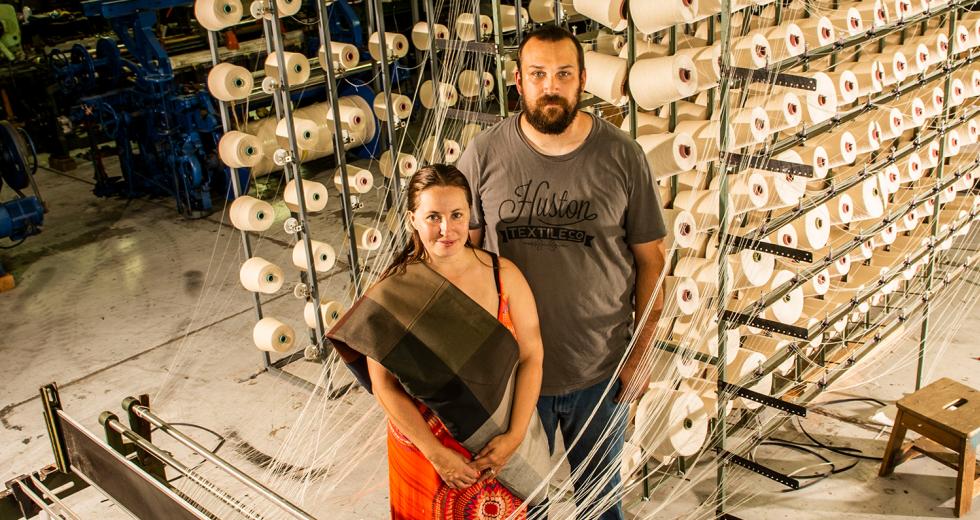During summer months, 6-year-old Hazel keeps busy playing in the office of Huston Textile Company, while her two younger siblings are in day care. It’s fitting that the first-born child of Ryan and Kat Huston should feel at home here. She is, after all, the inspiration for her parents’ textile milling business.
While Kat was pregnant in 2012, the couple brainstormed ways to comfortably tote a newborn around. “We knew that we didn’t want to use a stroller because we liked being able to take her to downtown (Sacramento), and pushing a stroller around down there is annoying … so we looked into other ways, and we found baby wrapping,” Kat says.
They bought a fabric wrap to wear around their chests with their baby snuggled inside, but Ryan figured he could make an even better one. The U.S. Army combat veteran was raised by a single mother who taught her son how to sew and embroider. So he bought a loom and wove wraps in his garage.
Soon, friends and family members expressed interest in the wraps, which the Hustons began selling online. They expanded into a full-fledged business in 2013, investing in power looms to make selvage fabric (meaning with finished edges) and getting into workwear. Later, they partnered with Fibershed, a nonprofit that promotes eco-friendly practices in fiber production. Nowadays, Huston Textile’s customers tend to fall within two main categories: Those who want American-made and supply-chain transparency, and those who want fabrics using local and sustainably sourced raw materials.
In 2017, Huston Textile Company moved into a converted military hangar at the former Mather Air Force Base. The 12,000-square-foot space is filled with 19 looms collected by the couple over the past few years, including two vintage looms from the 1960s. There’s also one from Louisiana used by the U.S. Department of Agriculture and two from a barn in Connecticut; the owners said the Hustons could have them for free as long as they could handle the cumbersome task of moving them. Ryan flew to the East Coast, packed up the looms in a truck and hit the road for the cross-country drive back home.
“I don’t know anybody that would say working with their spouse 100 percent of the time is their favorite thing. I like it because we can depend on each other and get mad at each other, and the next day there’s no hard feelings.” Kat Huston, cofounder, Huston Textile Company
Many of the looms aren’t operational, and Ryan cannibalizes them for parts, which appeals to his interest in machines and hands-on work. When he started his business, he had been studying for a bachelor’s degree in electronic and electrical engineering (he plans to resume his education in spring 2020).
“It’s part art and part science,” he says of weaving. “It’s one of the few things that you can do where you can kind of just make it up as you go. You have to know the end product and then figure out how to get there. I’m really an engineer-type person, so I enjoy the machinery and working on it.”
Ryan is the lead weaver and serves as CEO and president, and Kat is the office manager. The business is run solely by the husband-and-wife team, although their growth plan includes hiring employees. “Definitely, we don’t want it to be him and me forever,” Kat says. “We want more people. It would be great to have more people. Ryan can’t do all of it. Somebody needs to watch looms while they run, somebody needs to repair, somebody needs to do the office.”
In the meantime, the Hustons say they’ve figured out how to navigate the challenges of working closely together, learning that patience, open communication and the ability to resolve disagreements go a long way. “I love my husband, but I don’t necessarily always love working with him,” Kat says. “I don’t know anybody that would say working with their spouse 100 percent of the time is their favorite thing. I like it because we can depend on each other and get mad at each other, and the next day there’s no hard feelings.”
—
Get this and other stories delivered to your inbox weekly: Sign up for our free email newsletters by clicking or tapping here.
Recommended For You

Designated Hitters
Led by Susan and Jeff Savage, the River Cats are celebrating their 20th season
When Art Savage and his partners purchased a Minor-League Baseball team and moved it to a new stadium in West Sacramento in 2000, his wife, Susan Savage, never imagined that one day she would own and operate the Sacramento River Cats.



